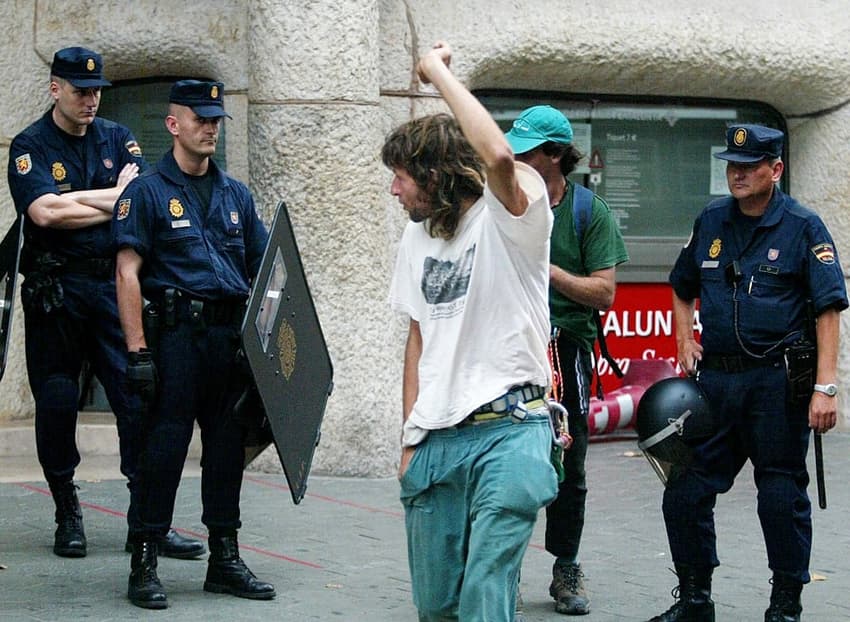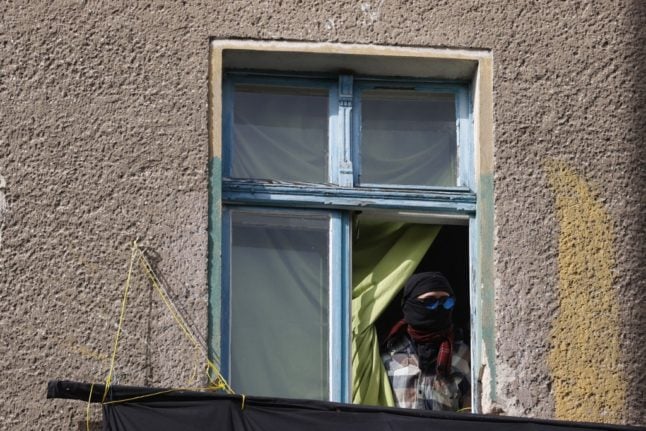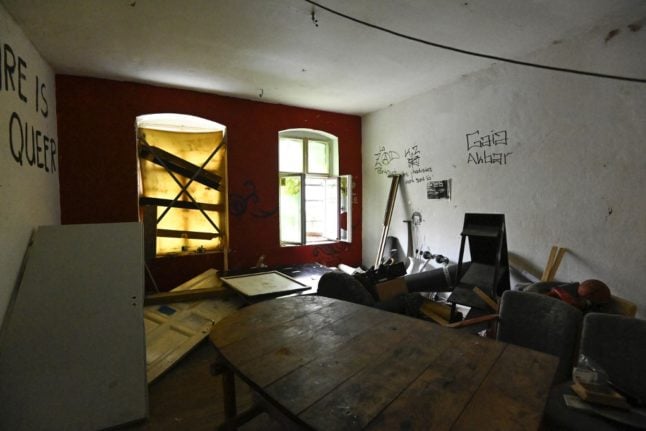Okupas: What's the law on squatting in Spain?

In recent years the Spanish squatting movement ‘Okupa’ has been on the rise. But with legislation aimed to remove squatters faster, what exactly is the law on squatting in Spain?
Squatting has long been a controversial issue in Spain.
Some point to the more than 3 million empty properties across Spain and the cost-of-living crisis as reasons to be more understanding when people can’t pay the rent.
Yet Spain’s ‘okupa’ movement is much more than that, with organisations intent on exploiting legal loopholes, or individuals who own their own properties which they rent out to others whilst they occupy ones that don't belong to them.
Unfortunately, Spain's evictions drama, which largely stems from people who can no longer pay their mortgages, has become mixed up with the country's squatting problem.
Critics say the Spanish law abandons property owners and that there are too many legal obstacles which hinder squatters' speedy eviction.
In the ten years from 2001 to 2011, the number of empty homes in Spain increased by 336,943 (an increase of 10.8 percent) to stand at 3.4 million according to the latest data available from the INE’s Population and Housing Census.
But as the number of empty houses increases, so has illegal squatting.
It's hard to be certain about how many properties exactly are currently occupied in Spain, as squatting is a clandestine act and there isn't a record of how many properties have been reclaimed by owners. According to interior ministry data, more than 10,000 homes have been illegally occupied every year since 2015. In 2021, it reached a record 17,274 cases.
What's clear is that squatting is an ongoing problem in Spain, with an average 49 reported cases a day.
Okupas can be found across Spain but the regions that tend to have the most are Catalonia far ahead, followed by Madrid, Andalusia, the Valencia region and the Canary Islands.
READ ALSO: Squatting in Spain: Which regions have the worst ‘okupa’ problems?
The law
The occupation of someone else's property does constitute a crime in Spain, as established in article 245 of Spain’s Penal Code: “Whoever occupies, without due authorisation, a property, dwelling or building belonging to someone else and which does not constitute their residence, or remains in the property against the will of the owner, will be punished with up to three to six months of prison”.
However, sentences in Spain under two years usually don’t result in actual prison time, which doesn't act as a dissuasion for okupas.
Spanish law also differentiates between usurpación (misappropriation) from allanamiento de morada (breaking and entering), the determining factor for the judge being whether the property is inhabited or not in terms of taking action against the okupas.
Fortunately, second homes are still considered a morada (dwelling) in Spain, as long as they are furnished and have all the basic services such as water and electricity. Therefore, they receive the same protection as first homes.
And yet, the devil is in the details.
If the okupación is reported within 48 hours and it is the first home of the owner, police officers may evict the squatters without the need for a court order. However, if more than 48 hours have passed and it's a second home, things get more complicated.

The first 48 hours of 'okupación' are crucial to determine whether a proprietor will need a court order to return to their property. (Photo by Odd ANDERSEN / AFP)
Squatters are often familiar with the law and use the principle of inviolability of the home to plead their case. By changing the locks they legally enforce this, as not even the owner can enter without a court order.
The squatters have the upper hand in this sense; if the true owners break in, the okupas can sue them, and if the proprietors don't pay the bills, they'll go on a defaulters' list. They'll use other tricks such as having goods ordered to the address to prove that it's their morada (dwelling) and having minors at the property to strengthen their legal protection.
In the meantime, all the owners can technically do is open legal proceedings against the squatters by placing a complaint (civil or penal) and proving that the property is indeed theirs and the squatters aren't unfairly treated tenants or similar.
If you hadn't guessed already, having your home occupied by squatters in Spain can work out to be a legal nightmare that lasts months, dare we say longer.
The Local Spain has written in detail about how homeowners in Spain can prevent this from happening to them.
- How to stop squatters from moving into your empty home in Spain
- Tips for leaving your Spanish home empty while you're away
Europe’s worst?
Experts say that Spanish property owners are among some of the worst protected in Europe.
According to Arantxa Goenaga, partner and lawyer at Círculo Legal Barcelona, "if we compare with the rest of the European Union, the situation in Spain is worse and much more unfavourable for the owner, not only because the judicial procedures are slower but also because greater protection measures are adopted for vulnerable citizens without any measure that favours the owners.”
Homeowners and legal experts alike have complained about the complicated legal structures surrounding squatting and evictions. Often, this means squatters are allowed to stay for months - even years - while the legal process is underway.
Fortunately for homeowners, the Spanish government is trying to do something about this.
2022 changes to the law
In October 2022, the governing party PSOE received plaudits for making changes to the Code 544 of the Law of Criminal Procedure to speed up evictions of squatters within a maximum period of 48 hours.
However, the new speedy evictions relate only to "trespassing or usurpation of real estate" and not those pre-existing tenants who simply stop paying rent and refuse to leave the property.
This second method, of simply refusing to pay rent and staying, is the most common method of squatting in Spain, accounting for around 70 of all cases, according to the lobby group La Plataforma de Afectados Ocupación.
This means that though the government’s measure is a positive step for homeowners, it does little to tackle the majority of squatting cases in Spain. It may speed up some evictions, but will likely do little to speed up or resolve the lengthy ongoing legal battles many property owners find themselves in.

Squatters in Spain often use the principle of inviolability of the home to increase their legal protection. (Photo by Tobias SCHWARZ / AFP)
What should I do if squatters move into my home?
The first 48 hours are crucial if your home or second home is illegally occupied.
If you can prove that squatters moved into your property within this two-day period, you can take the matter to the police and they can evict the okupas without a warrant.
If 48 hours have elapsed and the squatters have changed the lock, you will require a warrant and that’s when the legal ordeal begins.
You will have to file a request for eviction (demanda civil de deshaucio) and the judge will set a time and a date for you and the squatters to appear in court. Crucially, many okupas refuse to identify themselves or attend proceedings, which effectively stalls the process.
If any of the occupants are minors or vulnerable people, the judge is more likely to side with the squatters.
Comments
See Also
Squatting has long been a controversial issue in Spain.
Some point to the more than 3 million empty properties across Spain and the cost-of-living crisis as reasons to be more understanding when people can’t pay the rent.
Yet Spain’s ‘okupa’ movement is much more than that, with organisations intent on exploiting legal loopholes, or individuals who own their own properties which they rent out to others whilst they occupy ones that don't belong to them.
Unfortunately, Spain's evictions drama, which largely stems from people who can no longer pay their mortgages, has become mixed up with the country's squatting problem.
Critics say the Spanish law abandons property owners and that there are too many legal obstacles which hinder squatters' speedy eviction.
In the ten years from 2001 to 2011, the number of empty homes in Spain increased by 336,943 (an increase of 10.8 percent) to stand at 3.4 million according to the latest data available from the INE’s Population and Housing Census.
But as the number of empty houses increases, so has illegal squatting.
It's hard to be certain about how many properties exactly are currently occupied in Spain, as squatting is a clandestine act and there isn't a record of how many properties have been reclaimed by owners. According to interior ministry data, more than 10,000 homes have been illegally occupied every year since 2015. In 2021, it reached a record 17,274 cases.
What's clear is that squatting is an ongoing problem in Spain, with an average 49 reported cases a day.
Okupas can be found across Spain but the regions that tend to have the most are Catalonia far ahead, followed by Madrid, Andalusia, the Valencia region and the Canary Islands.
READ ALSO: Squatting in Spain: Which regions have the worst ‘okupa’ problems?
The law
The occupation of someone else's property does constitute a crime in Spain, as established in article 245 of Spain’s Penal Code: “Whoever occupies, without due authorisation, a property, dwelling or building belonging to someone else and which does not constitute their residence, or remains in the property against the will of the owner, will be punished with up to three to six months of prison”.
However, sentences in Spain under two years usually don’t result in actual prison time, which doesn't act as a dissuasion for okupas.
Spanish law also differentiates between usurpación (misappropriation) from allanamiento de morada (breaking and entering), the determining factor for the judge being whether the property is inhabited or not in terms of taking action against the okupas.
Fortunately, second homes are still considered a morada (dwelling) in Spain, as long as they are furnished and have all the basic services such as water and electricity. Therefore, they receive the same protection as first homes.
And yet, the devil is in the details.
If the okupación is reported within 48 hours and it is the first home of the owner, police officers may evict the squatters without the need for a court order. However, if more than 48 hours have passed and it's a second home, things get more complicated.

Squatters are often familiar with the law and use the principle of inviolability of the home to plead their case. By changing the locks they legally enforce this, as not even the owner can enter without a court order.
The squatters have the upper hand in this sense; if the true owners break in, the okupas can sue them, and if the proprietors don't pay the bills, they'll go on a defaulters' list. They'll use other tricks such as having goods ordered to the address to prove that it's their morada (dwelling) and having minors at the property to strengthen their legal protection.
In the meantime, all the owners can technically do is open legal proceedings against the squatters by placing a complaint (civil or penal) and proving that the property is indeed theirs and the squatters aren't unfairly treated tenants or similar.
If you hadn't guessed already, having your home occupied by squatters in Spain can work out to be a legal nightmare that lasts months, dare we say longer.
The Local Spain has written in detail about how homeowners in Spain can prevent this from happening to them.
- How to stop squatters from moving into your empty home in Spain
- Tips for leaving your Spanish home empty while you're away
Europe’s worst?
Experts say that Spanish property owners are among some of the worst protected in Europe.
According to Arantxa Goenaga, partner and lawyer at Círculo Legal Barcelona, "if we compare with the rest of the European Union, the situation in Spain is worse and much more unfavourable for the owner, not only because the judicial procedures are slower but also because greater protection measures are adopted for vulnerable citizens without any measure that favours the owners.”
Homeowners and legal experts alike have complained about the complicated legal structures surrounding squatting and evictions. Often, this means squatters are allowed to stay for months - even years - while the legal process is underway.
Fortunately for homeowners, the Spanish government is trying to do something about this.
2022 changes to the law
In October 2022, the governing party PSOE received plaudits for making changes to the Code 544 of the Law of Criminal Procedure to speed up evictions of squatters within a maximum period of 48 hours.
However, the new speedy evictions relate only to "trespassing or usurpation of real estate" and not those pre-existing tenants who simply stop paying rent and refuse to leave the property.
This second method, of simply refusing to pay rent and staying, is the most common method of squatting in Spain, accounting for around 70 of all cases, according to the lobby group La Plataforma de Afectados Ocupación.
This means that though the government’s measure is a positive step for homeowners, it does little to tackle the majority of squatting cases in Spain. It may speed up some evictions, but will likely do little to speed up or resolve the lengthy ongoing legal battles many property owners find themselves in.

What should I do if squatters move into my home?
The first 48 hours are crucial if your home or second home is illegally occupied.
If you can prove that squatters moved into your property within this two-day period, you can take the matter to the police and they can evict the okupas without a warrant.
If 48 hours have elapsed and the squatters have changed the lock, you will require a warrant and that’s when the legal ordeal begins.
You will have to file a request for eviction (demanda civil de deshaucio) and the judge will set a time and a date for you and the squatters to appear in court. Crucially, many okupas refuse to identify themselves or attend proceedings, which effectively stalls the process.
If any of the occupants are minors or vulnerable people, the judge is more likely to side with the squatters.
Join the conversation in our comments section below. Share your own views and experience and if you have a question or suggestion for our journalists then email us at [email protected].
Please keep comments civil, constructive and on topic – and make sure to read our terms of use before getting involved.
Please log in here to leave a comment.